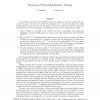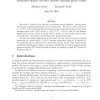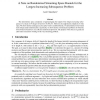ECCC
2010
13 years 9 months ago
2010
We show that proving results such as BPP = P essentially necessitate the construction of suitable pseudorandom generators (i.e., generators that suffice for such derandomization r...
ECCC
2010
13 years 9 months ago
2010
An arithmetic read-once formula (ROF for short) is a formula (a circuit in which the fanout of every gate is at most 1) in which the operations are {+,
ECCC
2010
13 years 9 months ago
2010
ECCC
2010
13 years 9 months ago
2010
We study a variant of the classical circuit-lower-bound problems: proving lower bounds for sampling distributions given random bits. We prove a lower bound of 1 - 1/n(1) on the st...
ECCC
2010
13 years 9 months ago
2010
We present an alternate proof of the result by Kabanets and Impagliazzo that derandomizing polynomial identity testing implies circuit lower bounds. Our proof is simpler, scales b...
ECCC
2010
13 years 9 months ago
2010
We prove that TAUT has a p-optimal proof system if and only if a logic related to least fixed-point logic captures polynomial time on all finite structures. Furthermore, we show t...
ECCC
2010
13 years 9 months ago
2010
The deterministic space complexity of approximating the length of the longest increasing subsequence of a stream of N integers is known to be ( N). However, the randomized comple...
ECCC
2010
13 years 9 months ago
2010
A design is a finite set of points in a space on which every "simple" functions averages to its global mean. Illustrative examples of simple functions are low-degree pol...
ECCC
2010
13 years 9 months ago
2010
We give new pseudorandom generators for regular read-once branching programs of small width. A branching program is regular if the in-degree of every vertex in it is either 0 or 2...
ECCC
2010
13 years 9 months ago
2010
The IP theorem, which asserts that IP = PSPACE (Lund et. al., and Shamir, in J. ACM 39(4)), is one of the major achievements of complexity theory. The known proofs of the theorem ...




